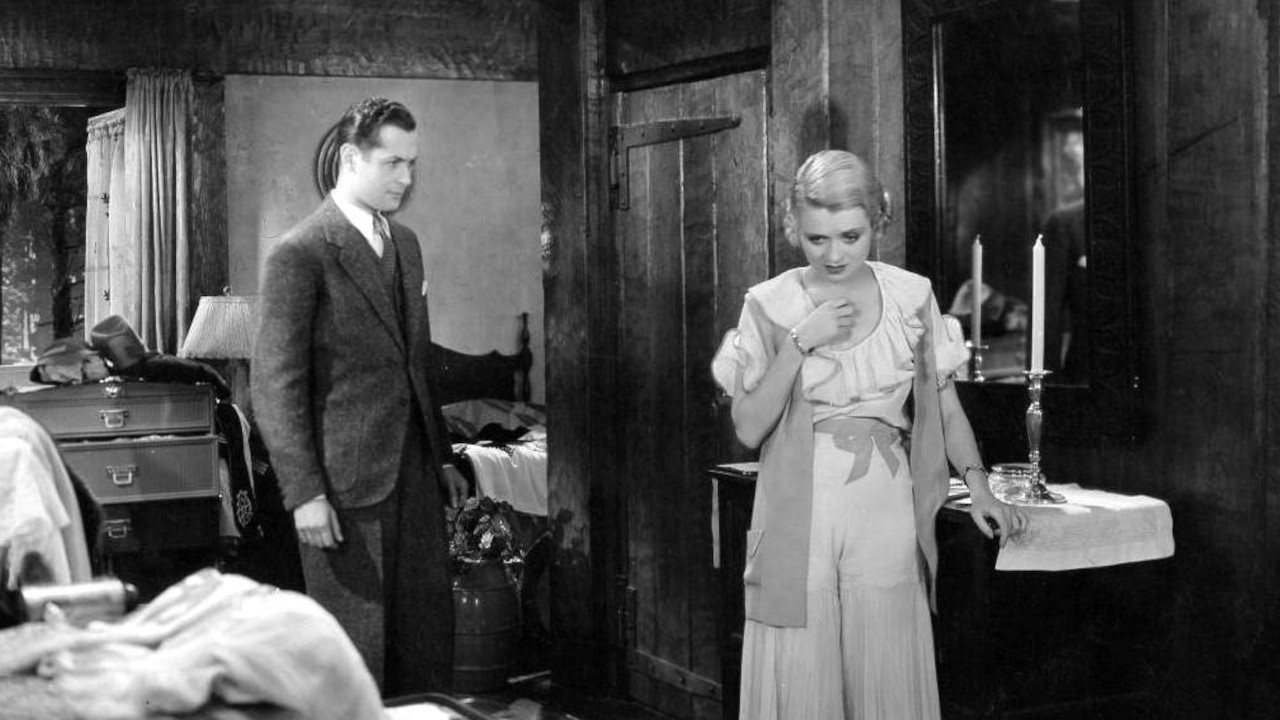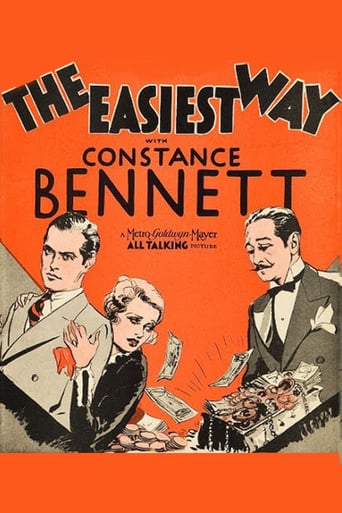

Constance Bennett is a woman who gets a sugar daddy in "The Easiest Way," also starring Adolphe Menjou, Robert Montgomery, Anita Page, and Clark Gable. Made in 1931, it's directed by Jack Conway, and it's very well done.Bennett plays Laura, who lives in a crowded tenement with her large family, which includes her father who manages not to work. She gets an opportunity to model for an advertising agency. While there, she catches the eye of the boss (Menjou) who offers her a life of luxury. She takes it. Her mother shuns her, and her brother-in-law, Clark Gable, has no use for her. While she and Menjou are in Colorado, she meets a reporter, Robert Montgomery, and they fall in love. She promises to be faithful to him while he's in South America for three months. But it's pretty hard to make it on her own.This is an interesting film. Because the actors were getting used to sound, the rhythm is occasionally off, i.e., there are sometimes awkward pauses between lines. Everyone's acting is good, with the exception of Marjorie Rambeau, who has a very melodramatic role and does the tremulous voice thing in her big monologue. Rambeau, however, had been a Broadway star, where her theatrics were more appropriate, and it took actors time to learn the art of film acting. She was a fantastic actress, and I particularly remember her as Joan Crawford's mother in "Torch Song." Constance Bennett, as usual, was very beautiful. She is excellent in the part of a torn, vulnerable woman. Gable is a tough guy sans mustache. He hadn't yet developed his screen persona, but the gorgeous smile was there. Robert Montgomery is wonderful as a young reporter.There was a neat shot where the camera travels up a building, zeroes in on a window, and then zooms in. It was dizzying and exciting, and it's the kind of detail that makes "The Easiest Way" a good watch. There are real outdoor scenes, too, no painted backdrops, and opulent sets. If they weren't opulent, they were realistic, for instance, the crummy apartment where Laura's family lives.There was another ending to this film that the Hays office vetoed. Apparently it was shown in some theaters but is no longer available. I'm a sap, so I liked the ending that's in the movie.
... View More"The Easiest Way" is an example of how Hollywood could deal with thorny subjects before the arrival of the Hays Code. We are presented with a situation in which a young, poor, but attractive young woman, could go up in the world using her natural charms in a realistic way. That was going to change in a few more years, as the Code would not let themes such as this one be dealt with the frankness prior to its arrival.The film, directed by Jack Conway, is curiosity piece by today's standards. The original work was made for the stage where there was an open mind about risky situations. We are presented with a poor family at the beginning of the story living in a crowded tenement. Laura, the beautiful young girl has no future of getting a rich man that will take her away from the poverty she is living. When a rich man enters her life, she sees the opportunity to escape her humble origins.The film deals in a realistic way with the subject of the illicit affair between Laura and Bill Brockton. When she falls for young Jack Madison, she believes that she must abandon the man that provides her comfort and easy life, until she finds herself penniless and must face with the fact that she has to go back to Bill, but loses Jack in the process. At the end, we watch her spying outside her married sister's suburban house which is the epitome of happiness.Constance Bennett makes an interesting Laura, but this is not her best role in the movies. Robert Montgomery is not seen enough in the film. Adolph Menjou makes a great Bill Brockton, the rich man who loves Laura in spite of the fact he knows Laura doesn't care for him. Clark Gable made a good impression as the brother-in-law critical to Laura. Marjorie Rambeau, Anita Page and Hedda Haper appear in minor roles.
... View MoreA beautiful young model finds THE EASIEST WAY to support her needy family is to become a rich man's mistress -- until she falls in love with an energetic reporter.This little film is strictly soap opera, but it's well presented and makes a pleasant diversion. The production values are good, especially in the opening sequence which reveals the inside of a tenement flat, and causes the viewer to appreciate the trouble MGM expended on even its small pictures.Beautiful Constance Bennett is very convincing as a woman who frankly admits her moral standing -- until true love complicates everything. Urbane Adolphe Menjou, as the rich businessman who controls Bennett, is slightly more sympathetic than usual in a role he could probably have played in his sleep. And Robert Montgomery gives his patented friendly portrayal as the steadfast fellow who earnestly loves Bennett -- until he is told the truth of her situation.A fine supporting cast helps the proceedings: tough-talking Marjorie Rambeau as an aging model out to squeeze every penny possible from the male animal; lazy J. Farrell MacDonald & careworn Clara Blandick as Bennett's poor parents; blonde Anita Page as Bennett's lively younger sister; and sturdy Clark Gable, as Page's laundryman boyfriend, who would eventually supplant Montgomery as MGM's favorite heartthrob.Movie mavens will recognize jovial Dell Henderson and stately Hedda Hopper, both uncredited as Bennett's Colorado hosts.
... View MoreWonderful story ruined by Hays Office has fabulous Constance Bennett escaping her New York slum upbringing by becoming a model and mistress to Adolphe Menjou. All is well until she runs into reporter Robert Montgomery in Colorado Springs (the Wild West in 1931). He's off to South America and asks Bennett to be good and wait for him. Well that lasts about a month. She runs out of money and goes back to Menjou. Better than it sounds until the hack ending. Solid performances by the stars, especially Bennett, and ably supported by Anita Page, Marjorie Rambeau, Clark Gable (his first MGM film), J. Farrell MacDonald, Clara Blandick, Jack Hanlon (as the sullen brother), and Hedda Hopper. The opening tenement scene is just wonderful. Gable is dynamic is his first big part. Rambeau is always terrific. Page is quite good in a supporting role. Menjou is slimy, but Constance Bennett is front and center and mesmerizing. She was a major star of her time--too bad she's mostly forgotten now.
... View More